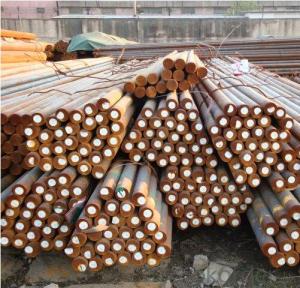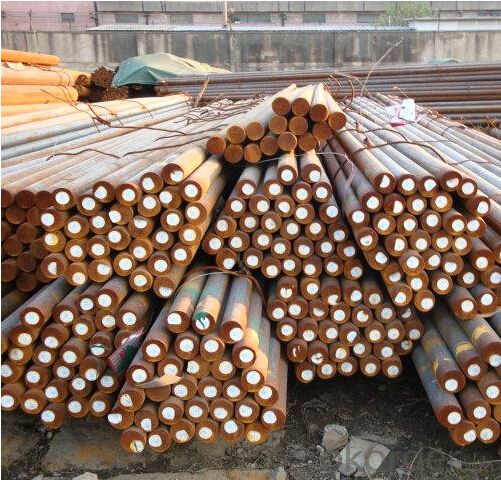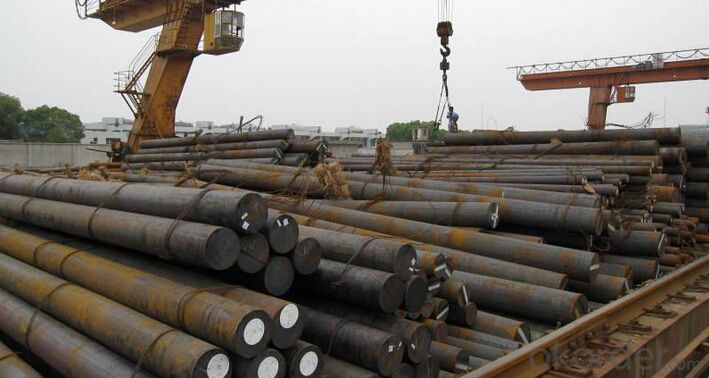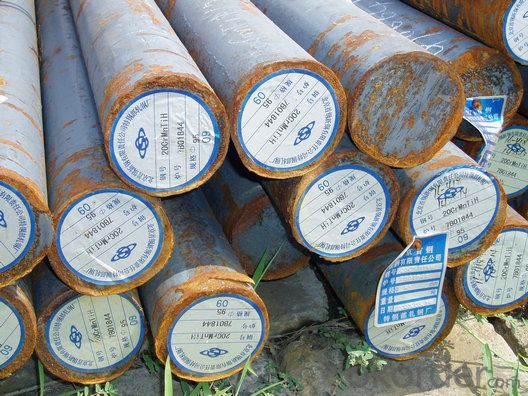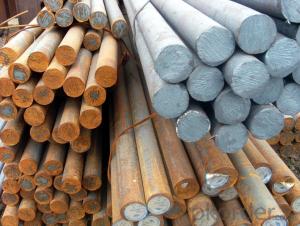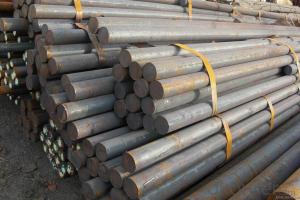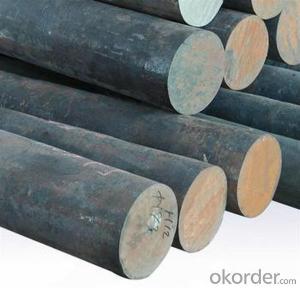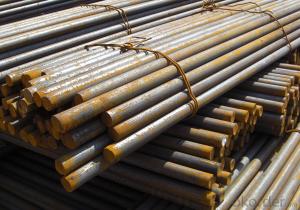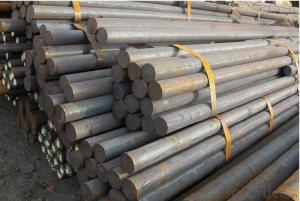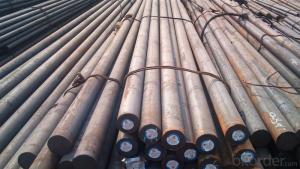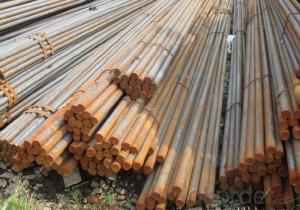Alloy Steel Cr12MoV Metal Steel Round Bars Special Steel
- Loading Port:
- China main port
- Payment Terms:
- TT OR LC
- Min Order Qty:
- 30 m.t.
- Supply Capability:
- 10000 m.t./month
OKorder Service Pledge
OKorder Financial Service
You Might Also Like
Specification
Chemical Composition(%)
| Country | Standard | C | Si | Mn | Cr | Mo | V | S | P | W |
| GB | C12MoV | 1.45-1.70 | ≤0.40 | ≤0.40 | 11.00-12.5 | 0.40-0.60 | 0.15-0.30 | ≤0.030 | ≤0.030 | |
| DIN | 1.2601 | 1.55-1.75 | 0.25-0.40 | 0.20-0.40 | 11.00-12.0 | 0.50-0.70 | 0.10-0.50 | ≤0.030 | ≤0.030 | 0.40-0.60 |
Available Size
| Rolled flat steel | 12-90mm×205-610mm×L |
| Forged flat steel | 100-300mm×400-600mm×L |
Heat Treatment
| Item | Temperature℃ | Hardness |
| Anneal | 850-880 | ≤255HB |
| Quenching | No.1:980-1040 | 60-63HRC |
| No.2:1050-1130 | 42-50HRC | |
| Tempering | No.1:200-300(1) | 57-60HRC |
| No.2:200-300(2-3) | 58-62HRC |
Characterstics
| 1.High hardening ability and abrasion resistance | ||||||||
| 2.Less quenching deformation | ||||||||
| 3.Higher toughness and more homogeneous carbide distribution than Cr12 steel |
Applications: Suitable for various complicated cold working dies with high precision and long lifetime,such as punching dies,cold extrusion dies,thread rolling dies,screw plates,cold extrusion dies,and precise measuring devices
Main Product
Plastic Mould Steel
DIN 1.2311,1.2738,1.2083,1.2316 etc.
AISI P20,P20+Ni,420 etc.
JIS SUS420J2
Hot Work Steel
DIN 1.2344,1.2343,1.2367,1.2365,1.2581,1.2713 etc.
AISI H13,H11,H10,H21, etc.
JIS SKD61,SKD6,SKD5,SKT4 etc.
Cold Work Steel
DIN 1.2739, 1.2601, 1.2080, 1.2436, 1.2631, 1.263, 1.2510, 1.2327 etc.
AISI D2, D5, D3, D6, A8, A2, O1 etc.
JIS SKD10, SKD11, SKD1, SKS3 etc.
High Speed Steel
DIN 1.3343, 1.3243, 1.3247, 1.3355 etc.
AISI M2, M35, M42, T1 etc.
JIS SKH51, SKH35, SKH59, SKH2 etc.
Alloy Structural Steel
DIN 1.7035,1.6511,1.7220,1.7225 etc.
AISI 5140, 4340, 4135, 4140 etc.
JIS SCr440,SNCM439,SCM435,SCM440 etc.
Stainless & Carbon Steel or Others
DIN 1.4125,1.1191 etc
AISI 440C,1045, 1020 etc.
JIS SUS440C,S45C etc
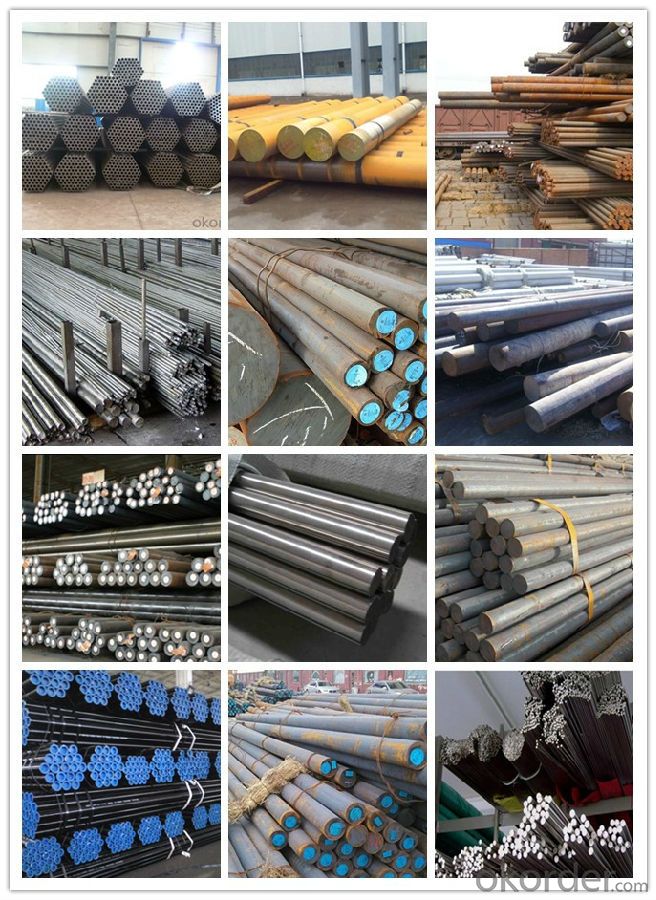 Product show
Product show
Workshop show
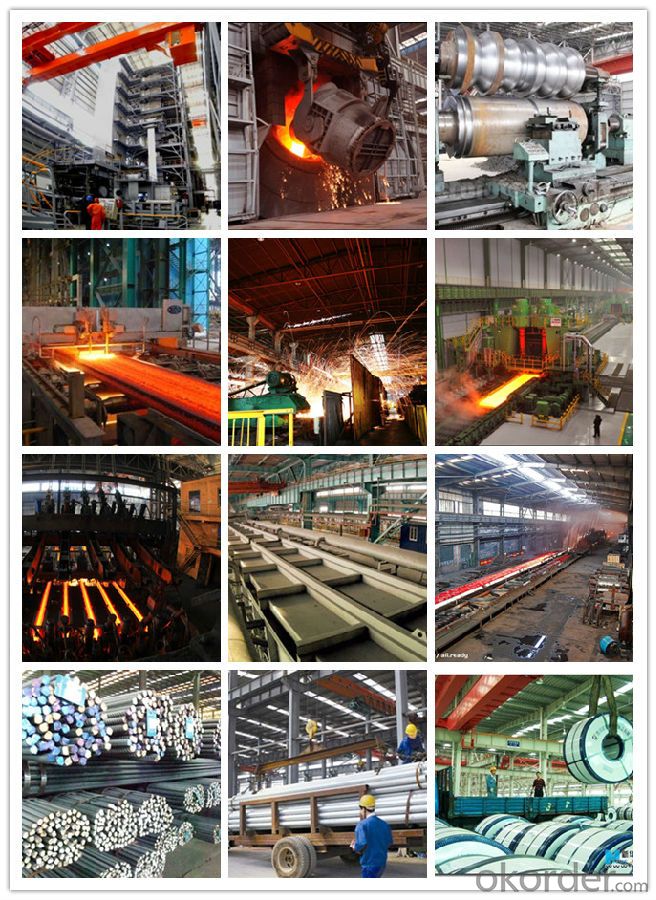
Shipping
1. FedEx/DHL/UPS/TNT for samples, Door-to-Door;
2. By Air or by Sea for batch goods, for FCL; Airport/ Port receiving;
3. Customers specifying freight forwarders or negotiable shipping methods!
Delivery Time: 3-7 days for samples; 5-25 days for batch goods.
Payment Terms
1.Payment: T/T, L/C, Western Union, MoneyGram,PayPal; 30% deposits; 70% balance before delivery.
2.MOQ: 1pcs
3.Warranty : 3 years
4.Package Informations: 1) EXPORT, In 20 feet (GW 25 ton) or 40 feet Container (GW 25 ton)
2)as customer's requirement
Why choose us?
(1) The leading exporter in China special steel industry.
(2) Large stocks for various sizes, fast delivery date.
(3) Good business relationship with China famous factories.
(4) More than 7 years steel exporting experience.
(5) Good after-sales service guarantee.
- Q: How is high-temperature steel used in power generation equipment?
- High-temperature steel is commonly used in power generation equipment due to its excellent heat resistance properties. It is utilized in the manufacturing of boilers, turbines, and heat exchangers, where it can withstand extreme temperatures and pressures. This steel variant helps increase the efficiency and reliability of power plants by withstanding the intense heat generated during power generation processes.
- Q: How does special steel contribute to reducing product rejection rates?
- Special steel contributes to reducing product rejection rates by providing superior strength, durability, and resistance to corrosion. This ensures that the manufactured products meet the required specifications and perform optimally, reducing the likelihood of rejection due to quality issues. Additionally, special steel's precise composition and enhanced mechanical properties enable more accurate and consistent manufacturing processes, minimizing variations and defects that could lead to product rejection.
- Q: What are the different types of special steel coatings?
- Various special steel coatings exist to enhance the properties and performance of steel. Some commonly used types include: 1. Galvanized Coatings: These coatings involve applying a layer of zinc to the steel surface. Galvanized coatings provide excellent corrosion resistance, making them suitable for outdoor applications and structures exposed to harsh environments. 2. Epoxy Coatings: Known for their exceptional durability and chemical resistance, epoxy coatings protect steel from corrosion, abrasion, and chemical exposure. They can be single or multi-layer systems, extending the steel's lifespan and performance. 3. Powder Coatings: Powder coatings, applied electrostatically and cured under heat, offer excellent protection against corrosion, impact, and UV damage. They come in various colors and finishes, making them popular for aesthetic purposes. 4. Thermal Spray Coatings: These coatings involve applying molten particles onto the steel surface using a thermal spray gun. Ceramic coatings are the most common type, providing enhanced wear resistance, thermal insulation, and corrosion protection. 5. PVD Coatings: Physical Vapor Deposition (PVD) coatings deposit thin layers of metallic or ceramic materials onto the steel surface through vaporization. PVD coatings improve hardness, wear resistance, and reduce friction. 6. Organic Coatings: Polyurethane or acrylic coatings, known as organic coatings, protect against corrosion, UV damage, and chemical exposure. They are commonly used in architecture, automotive parts, and industrial equipment. 7. Chrome Plating: Chrome plating involves depositing a layer of chromium onto the steel surface. This coating offers excellent corrosion resistance, hardness, and a decorative finish. It is often used in automotive applications and for decorative purposes. Selecting the appropriate special steel coating is crucial, considering the specific requirements of the steel component or structure, including corrosion resistance, durability, aesthetics, and environmental factors.
- Q: What are the different certifications available for special steel?
- There are several certifications available for special steel, including ISO 9001, ISO 14001, ISO/TS 16949, and AS9100. These certifications ensure that the steel meets specific quality standards, environmental management practices, automotive industry requirements, and aerospace industry standards, respectively.
- Q: What are the main applications of special steel in the food packaging industry?
- Special steel is widely used in the food packaging industry due to its various applications. It is primarily utilized in the production of food cans, closures, and other packaging materials. Special steel offers excellent corrosion resistance, ensuring the preservation and safety of the packaged food. It also provides high strength and durability, maintaining the integrity of the packaging during transportation and storage. Additionally, special steel can be easily formed into different shapes and sizes, allowing for versatile packaging designs. Overall, the main applications of special steel in the food packaging industry include ensuring food safety, promoting product longevity, and enabling creative packaging solutions.
- Q: What is the maximum temperature that special steel can withstand?
- The maximum temperature that special steel can endure relies on the particular steel type employed. Special steels are engineered to possess improved qualities, including heightened resistance to heat, enabling them to endure higher temperatures in comparison to standard steels. To illustrate, certain special steels, like heat-resistant stainless steels, can withstand temperatures of approximately 1200 degrees Celsius (2200 degrees Fahrenheit). These steels are frequently utilized in scenarios where high temperatures are encountered, such as in furnaces, boilers, and exhaust systems. Different types of special steels, such as tool steels or high-speed steels, may have varying limits on their maximum temperature. These steels are commonly employed in cutting tools, molds, and machining applications, where they must maintain their hardness and strength at elevated temperatures. It should be noted that the maximum temperature that special steel can endure is also influenced by factors such as the duration of exposure to high temperature, the specific composition of the alloy, and any additional processes of heat treatment applied. Therefore, it is vital to refer to the manufacturer's specifications or seek professional advice to obtain accurate information regarding the maximum temperature limit for a specific type of special steel.
- Q: What are the different machining techniques for special steel?
- There are several machining techniques specifically used for special steel, such as turning, milling, drilling, and grinding. Each technique involves different tools and processes to shape and cut the steel, depending on the required specifications and desired outcome. Additionally, other specialized techniques like electrical discharge machining (EDM) and laser cutting can also be utilized for special steel machining.
- Q: How is special steel used in the aerospace sector?
- Special steel is used in the aerospace sector for various applications such as manufacturing engine components, landing gear, and structural parts. Its high strength-to-weight ratio, corrosion resistance, and ability to withstand extreme temperatures make it ideal for enhancing the performance, durability, and safety of aircraft.
- Q: What are the properties of die steel?
- Die steel, also known as tool steel, possesses various properties that make it suitable for use in die and mold-making applications. Some of the key properties of die steel include: 1. Hardness: Die steel is known for its high hardness, which helps in resisting wear, abrasion, and deformation during the manufacturing process. 2. Toughness: Die steel exhibits good toughness, enabling it to withstand higher impact and shock loads without fracturing or breaking. 3. Wear resistance: Die steel has excellent wear resistance, allowing it to maintain its shape and sharpness even when subjected to repeated contact with other materials. 4. Heat resistance: Die steel can withstand high temperatures without losing its hardness and strength, making it ideal for applications involving hot working conditions. 5. Machinability: Die steel is relatively easy to machine, allowing for the precise shaping and forming of dies and molds. 6. Corrosion resistance: Depending on the specific alloy composition, die steel can offer varying degrees of corrosion resistance, protecting it from environmental factors. Overall, the properties of die steel contribute to its ability to withstand high pressures, temperatures, and mechanical stresses, making it a preferred material for manufacturing dies and molds used in various industries.
- Q: What industries commonly use special steel?
- Special steel, also known as alloy steel, is widely used in various industries due to its exceptional properties and performance characteristics. Some of the industries that commonly utilize special steel include: 1. Automotive Industry: Special steel is extensively used in the manufacturing of components for automobiles, such as crankshafts, camshafts, gears, and axles. Its high strength, durability, and excellent heat resistance make it ideal for withstanding the demanding conditions of the automotive sector. 2. Aerospace Industry: Special steel finds applications in the aerospace industry for manufacturing critical components like turbine blades, landing gear, and structural parts. Its ability to withstand high temperatures and maintain structural integrity under extreme conditions is crucial for aerospace applications. 3. Oil and Gas Industry: Special steel is vital in the oil and gas sector for applications like drill bits, valves, pipelines, and offshore platform components. Its corrosion resistance, high strength, and resistance to extreme temperatures and pressures make it suitable for these demanding environments. 4. Construction Industry: In the construction industry, special steel is used in the fabrication of structural components, reinforcement bars, and high-rise building frameworks. Its high tensile strength, toughness, and resistance to wear and tear ensure the safety and stability of the structures. 5. Tool and Die Industry: Special steel is widely used in the tool and die sector for manufacturing cutting tools, molds, dies, and various machine components. Its ability to retain sharpness, resist deformation, and withstand high pressures and temperatures make it indispensable for these applications. 6. Energy Industry: Special steel is extensively used in power generation plants, including nuclear, thermal, and renewable energy facilities. It is used for manufacturing turbines, boilers, heat exchangers, and other critical components due to its high temperature and corrosion resistance properties. 7. Medical Industry: Special steel plays a crucial role in the medical field, especially in surgical instruments and implants. Its biocompatibility, strength, and resistance to corrosion make it suitable for applications like joint replacements, dental instruments, and surgical cutting tools. 8. Manufacturing Industry: Special steel is widely used in various manufacturing processes, such as machining, forging, and casting. It is employed in the production of machine tools, industrial equipment, and heavy machinery components due to its high strength, toughness, and versatility. These are just a few examples of the industries that commonly utilize special steel. Its unique properties make it an essential material for a wide range of applications, where strength, durability, heat resistance, and corrosion resistance are critical factors.
Send your message to us
Alloy Steel Cr12MoV Metal Steel Round Bars Special Steel
- Loading Port:
- China main port
- Payment Terms:
- TT OR LC
- Min Order Qty:
- 30 m.t.
- Supply Capability:
- 10000 m.t./month
OKorder Service Pledge
OKorder Financial Service
Similar products
Hot products
Hot Searches
Related keywords
